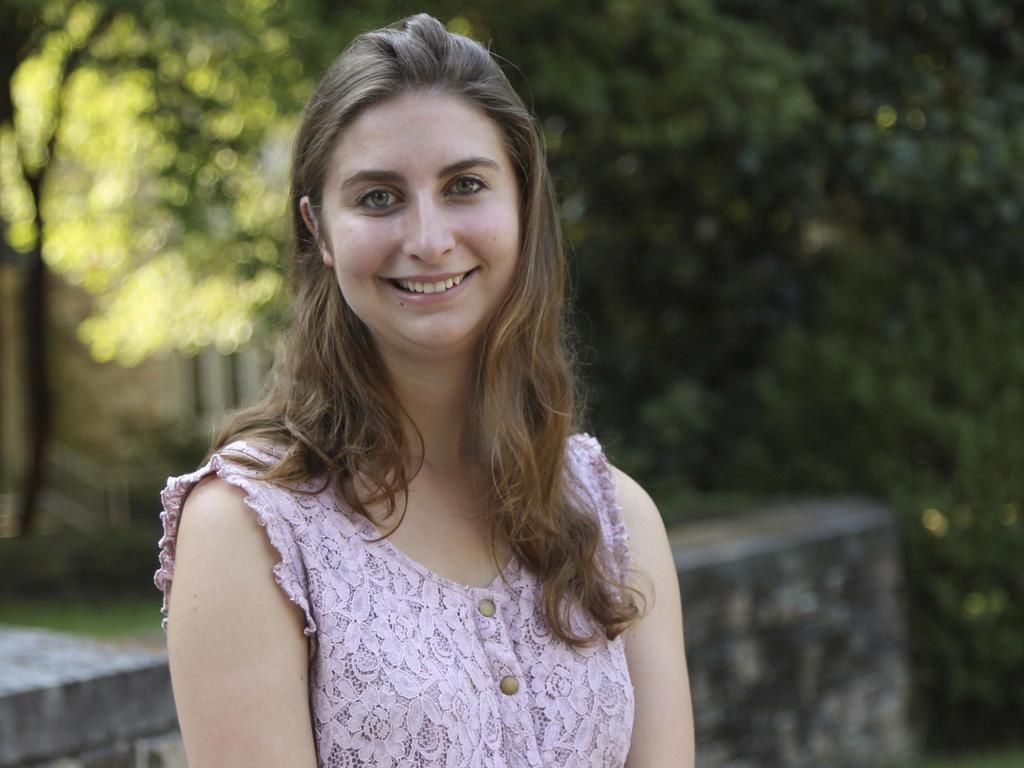Roz KennyBirch ’17 came to Rhodes College from Exeter, New Hampshire, but quickly became involved in the culture and politics of the Mid-South. “I wanted to experience a new culture, especially since there is no easier time to move to a new geographic area than for college,” says KennyBirch, when asked about her decision to attend Rhodes College. As a history and international studies bridge major, she appreciates the diversity that the region’s varied political affiliations brings to the campus. “Developing connections in a new area of the nation has helped extend my network outside of my home state,” says KennyBirch, “and I have also met friends from all over the country and the world.”
KennyBirch also notes how easy it is for students to find opportunities on campus and in the community to pursue their interests. Internship connections, volunteer opportunities, and even campus-based events help students connect their studies to the city outside Rhodes’ campus. As it turns out, an event on campus sparked her interest in her newest endeavor.
“I went to an art exhibit on the theme of home and space in the Clough-Hanson gallery, and at this exhibit they had a whole room dedicated to books about space and art. I thought, ‘This is so cool. I’ve never seen an art exhibit at Rhodes that has books and materials to go along with the exhibit.’” She asked who compiled the collection, and it turned out that it was the work of the Mellon Faculty Innovation Fellowship Program, a $600,000 grant awarded to Rhodes in 2014 by The Andrew W. Mellon Foundation. Students participating as engagement and scholarship fellows through the grant work directly with Rhodes’ Mellon postdoctoral fellows and current faculty to contribute to the work of the college in ways that complement the classroom education through innovative pedagogy and research.
Inspired by the project, KennyBirch applied to become a fellow and was selected for the 2016-2017 academic year. “We work on different projects that involve digital technology, but also new methods of pedagogy, and cross-discipline projects, and we work on these in various academic disciplines,” says KennyBirch. “I’ve been working on about nine different projects this year.” She adds that while some fellows devote their 10 hours a week to one project, she “fills in the cracks where necessary” and helps in any way that she can with other projects.
Her main projects have included Professor Dee Garceau’s historical documentary filmmaking class and Professor Rebecca Finlayson’s academic writing course. For both courses, KennyBirch conducted extensive research, but also looked for sources and contacts that could help broaden the information available to students and promote deeper investigation on the subjects.
“I would sit in the class and take notes on what the students were working on and help identify themes they’d be using for their film,” says KennyBirch about her work for Gaurceau’s class. She researched for the students, using resources in Memphis and across the country, including contacting a historian and a filmmaker directly for their expertise on the subject.
KennyBirch helped Finlayson’s academic writing course by finding resources that focused on leadership, motivation, and writing centers in high schools, as Finlayson was looking for more information to add to her course. The course helps Rhodes students set up writing centers in Memphis high schools, so KennyBirch helped connect the class to Rhodes alums who now work for Shelby County Schools. In addition, she helped develop Finlayson’s idea of an Urban Writing Exchange, which would be an online platform where people who are in different high schools and different colleges can share work.
Even KennyBirch’s life outside of Rhodes’ campus connects to the Mellon Foundation. Her internship at the National Civil Rights Museum has helped her see how her work as a Mellon Fellow connects to Memphis. In January, Rhodes received a $600,000 grant from The Andrew W. Mellon Foundation to further its partnership with the National Civil Rights Museum, as both organizations continue to research and foster dialogue about current social issues in Memphis. “That’s been a cool juxtaposition, seeing how the Mellon Foundation connects to other things in town, in addition to Rhodes’ pedagogical practices,” says KennyBirch, who plans on brainstorming with her boss at the museum to see how the student fellows at Rhodes might connect with that partnership.
As KennyBirch considers her past work in her history major and her plans to earn an advanced degree in history, she considers her work as a Mellon Fellow one of the best parts of her Rhodes experience. “It’s been so much fun. I would say the Mellon is the most culminating experience of Rhodes for me, but it all connects. Papers I wrote prepared me for this, and all the Mellon projects connect. It’s really cool how it all comes together.”
By Katherine Hancock ’18
